

OIL! OIL! OIL! You Can't Eat Tar Sands. A startling new study from the Center for Global Development shows that full development of the Canadian Tar Sands would have a devastating effect on global food production, especially in climate vulnerable continents such as Africa.

A loss in agricultural productivity due to climate change will affect more than 3 billion people around the world. Because of the massive carbon emissions from the Canadian Tar Sands, full exploitation of the resource would lead to a 5.6 percent loss in productivity, with 25 countries experiencing losses of 7.1 percent. Countries with especially damaging impacts include the already drought stricken Ethiopia, Sudan, and other Horn of Africa nations, as well as major population centers like India.
This is incredibly unjust. As the report says, "There is striking asymmetry in regional impacts. Pipelines create profits, perils. By Betsey Piette Published Jan 8, 2012 10:59 AM Not so hidden in the late December “tax deal” was a provision to force a quick decision on the Keystone XL oil pipeline project, which would stretch from the Tar Sands oil extraction project in Alberta, Canada, to the Gulf of Mexico.
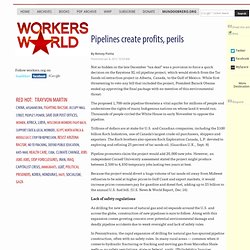
While first threatening to veto any bill that included the project, President Barack Obama ended up approving the final package with no mention of this environmental threat. The proposed 1,700-mile pipeline threatens a vital aquifer for millions of people and undermines the rights of many Indigenous nations on whose land it would run. Thousands of people circled the White House in early November to oppose the pipeline. Trillions of dollars are at stake for U.S. and Canadian companies, including the $100 billion Koch Industries, one of Canada’s largest crude oil purchasers, shippers and exporters. Pipeline promoters claim the project would add 20,000 new jobs. Lack of safety regulations In Pennsylvania, Gov. Tar Sands. Tar Sands’ Soiled Oil.
Energy producers are spending $15 billion a year to triple oil production from the bitumen-saturated tar sands of northern Alberta, Canada, which are the largest source of oil imports to the U.S. pipeline companies.
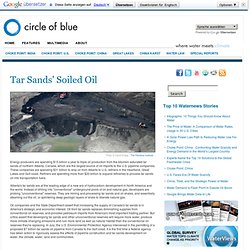
These companies are spending $31 billion to ship oil from Alberta to U.S. refiners in the Heartland, Great Lakes and Gulf coast. Refiners are spending more than $20 billion to expand refineries to process tar sands oil into transportation fuels. Oil sands. Oil sands, or tar sands, are a complex mixture of bitumen, oil, sand, water and clay. Environmentally, oil sands are one of the worst forms of energy. A joint report by WWF-UK and The Co-operative Bank highlights that their development is taking the world in the wrong direction. Their extraction causes three times the carbon emissions of conventional oil production, and destroys the local environment – devastating boreal (or northerly coniferous) forests and using massive amounts of river water.
They contribute to climate change, and create dangerous waste including poisonous water that leaks into the wider environment. The Canadian government and oil industry are pinning their hopes on the untried technology of carbon capture and storage (CCS) that would capture the carbon dioxide emissions from oil sands operations and store them underground. Unconventional energy Oil sands belong to a group of energy sources called unconventionals. Toxic fuel An unconventional future Tackling climate change.
Tar sands - Water for Oil - Hot Topics Forum. Now that extracting oil from tar sands is 'feasible' - ~66% of the world's oil reserves are in tar sands - here's another reason driving a gas guzzler isn't just the driver's business.

"Currently the oil sands consume three to six barrels of water per barrel of oil produced. "The wetlands in northern Alberta are already showing negative effects of declining water supply, but large oil sands projects continue to be proposed and approved, says the study. " Water for oil: study predicts unprecedented water crisis on the Prairie DENNIS BUECKERT Mon Apr 3, 6:51 PM ET OTTAWA (CP) - Canada's Prairies will face an unprecedented water crisis in coming years due to declining river flows and growing water usage - especially in processing Alberta's vast oil sands, says a new study.
Summer flows in Prairie rivers are already 20 to 80 per cent lower than in the early part of the 20th century, say Alberta researchers David Schindler and W.F. When will the crisis hit? Copyright © 2006 Canadian Press. Exposing the Tar Sands. We all value clean, fresh water.
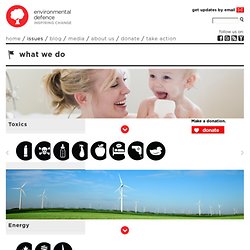
We drink it. We swim in it and fish from it. We enjoy lazy summer weekends or vacations by its shores. We educate people about the need for safer, cleaner water – and how we can protect the Great Lakes and St. STOP: Stop Tar Sands Operations Permanently. Quick Facts - The Dirt on Oil Sands - Dirty Oil Sands. Will Tar Sands Pipeline Threaten Groundwater? This story is part of a special National Geographic News series on global water issues.
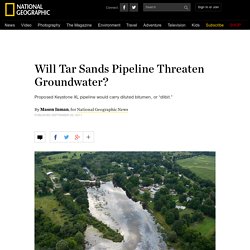
For two weeks in late August and early September, environmental activists staged sit-ins in front of the White House to protest a pipeline that would carry a slurry of tar sands from Alberta, Canada, to Texas. Their objection? Because the gooey mixture of oil and sand that comprises tar sand must be broken down to form normal crude, extracting it is a messy business that produces far more carbon emissions than does extracting regular crude. Who Killed the Tar Sands Water Report? The following article written by Andrew Nikiforuk provides a good explanation for why the Government of Canada's Environment and Sustainable Development Committee decided to destroy a report on the impacts of tar sands projects on water.
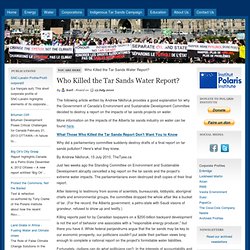
More information on the impacts of the Alberta tar sands industry on water can be found here. What Those Who Killed the Tar Sands Report Don't Want You to Know Why did a parliamentary committee suddenly destroy drafts of a final report on tar sands pollution? Here's what they knew. By Andrew Nikiforuk, 15 July 2010, TheTyee.ca. Top 10 Facts About the Alberta Oil Sands. Tar Sands Projects Responsible for Water Pollution in Alberta's Rivers - Despite Industry Claims to Contrary.
Photo: sbamueller via flickr Contradicting previous industry- and government-backed studies about the source of pollution occurring downstream from Alberta tar sands projects, a new study in the Proceedings of the National Academy of Sciences says that high levels of lead, mercury, cadmium, zinc and other pollutants are not naturally occurring.
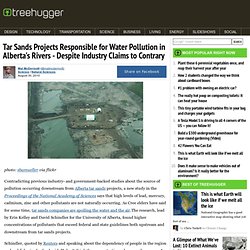
As Cree elders have said for some time, tar sands companies are spoiling the water and the air.The research, lead by Erin Kelley and David Schindler for the University of Alberta, found higher concentrations of pollutants that exceed federal and state guidelines both upstream and downstream from tar sands projects. Schindler, quoted by Reuters and speaking about the dependency of people in the region on local fisheries for food said, "I don't think the concentrations alone are dangerous. I worry about some of them, like mercury, because there parts per trillion translate into parts per million in fish. " Like this? Water Depletion. What the Tar Sands Need: Processing requires massive inputs of water, energy, land, labour. December 31, 2007 Processing requires massive inputs of water, energy, land, labour by Dru Oja Jay The Dominion - A Suncor processing plant, as seen from the Athabasca River.

Photo: Dru Oja Jay. Oil Sands: The Costs of Alberta's "Black Gold" During a June 28 visit to Washington, D.C., Ralph Klein, the premier of Canada’s western province of Alberta, spoke about the vast energy potential in his region and reassured U.S. government officials that Alberta’s oil reserves are secure.

The following day, two leading North American environmental organizations, the Natural Resources Defense Council and Canada’s Pembina Institute, hosted a panel discussion in Washington to provide what they considered to be a more complete picture of Albertan oil development.